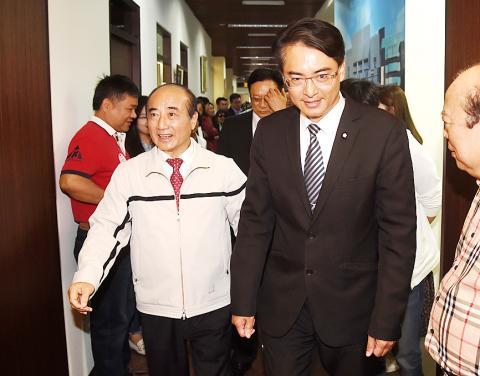Two Chinese Nationalist Party (KMT) presidential hopefuls yesterday called on the party to make a decision about how to handle its primary to choose a candidate for next year’s election.
KMT Legislator Wang Jin-pyng (王金平), who served as legislative speaker for 17 years, said that the party’s mercurial approach to nomination regulations made it difficult to comment or react, while former New Taipei City mayor Eric Chu (朱立倫) said that regardless of the options, the party must decide soon.
As long as a candidate is chosen fairly, everyone would support the decision, Wang added.

Photo: Huang Yao-cheng, Taipei Times
They were responding to a series of comments by KMT officials, such as KMT Chairman Wu Den-yih’s (吳敦義) insinuation on Saturday last week that the party would consider drafting Kaohsiung Mayor Han Kuo-yu (韓國瑜) as a potential candidate.
KMT Organizational Development Committee director Lee Che-hua (李哲華) on Wednesday proposed that the party sit down with Chu and Wang for “pre-primary negotiations” about listing Han among them in public opinion polls and party member surveys, as Han is unlikely to register for the primary himself.
Chu said that he would not rule out support for drafting Han if it is the best option for the party.
However, Lee’s proposal would cause others who have dropped the idea of running to reconsider, Chu said, naming Taipei City Councilor Lo Chih-chiang (羅智強), former Taipei County commissioner Chou Hsi-wei (周錫偉) and Sun Yat-sen School president Chang Ya-chung (張亞中) as examples.
Lee yesterday said that his proposal would prevent the possibility of the KMT National Congress selecting another candidate over the person who won the party primary.
“We would have liked for Chu and Wang to consider including Han as a possible candidate, as it would mean that regardless of who prevails, the party has selected its best candidate,” Lee said.
However, if Wang and Chu will not settle matters via negotiations, then the primary would continue as planned, Lee added.
Additional reporting by Shih Hsiao-kuang

CHAOS: Iranians took to the streets playing celebratory music after reports of Khamenei’s death on Saturday, while mourners also gathered in Tehran yesterday Iranian Supreme Leader Ayatollah Ali Khamenei was killed in a major attack on Iran launched by Israel and the US, throwing the future of the Islamic republic into doubt and raising the risk of regional instability. Iranian state television and the state-run IRNA news agency announced the 86-year-old’s death early yesterday. US President Donald Trump said it gave Iranians their “greatest chance” to “take back” their country. The announcements came after a joint US and Israeli aerial bombardment that targeted Iranian military and governmental sites. Trump said the “heavy and pinpoint bombing” would continue through the week or as long

TRUST: The KMT said it respected the US’ timing and considerations, and hoped it would continue to honor its commitments to helping Taiwan bolster its defenses and deterrence US President Donald Trump is delaying a multibillion-dollar arms sale to Taiwan to ensure his visit to Beijing is successful, a New York Times report said. The weapons sales package has stalled in the US Department of State, the report said, citing US officials it did not identify. The White House has told agencies not to push forward ahead of Trump’s meeting with Chinese President Xi Jinping (習近平), it said. The two last month held a phone call to discuss trade and geopolitical flashpoints ahead of the summit. Xi raised the Taiwan issue and urged the US to handle arms sales to

State-run CPC Corp, Taiwan (CPC, 台灣中油) yesterday said that it had confirmed on Saturday night with its liquefied natural gas (LNG) and crude oil suppliers that shipments are proceeding as scheduled and that domestic supplies remain unaffected. The CPC yesterday announced the gasoline and diesel prices will rise by NT$0.2 and NT$0.4 per liter, respectively, starting Monday, citing Middle East tensions and blizzards in the eastern United States. CPC also iterated it has been reducing the proportion of crude oil imports from the Middle East and diversifying its supply sources in the past few years in response to geopolitical risks, expanding

Pro-democracy media tycoon Jimmy Lai’s (黎智英) fraud conviction and prison sentence were yesterday overturned by a Hong Kong court, in a surprise legal decision that comes soon after Lai was jailed for 20 years on a separate national security charge. Judges Jeremy Poon (潘兆初), Anthea Pang (彭寶琴) and Derek Pang (彭偉昌) said in the judgement that they allowed the appeal from Lai, and another defendant in the case, to proceed, as a lower court judge had “erred.” “The Court of Appeal gave them leave to appeal against their conviction, allowed their appeals, quashed the convictions and set aside the sentences,” the judges